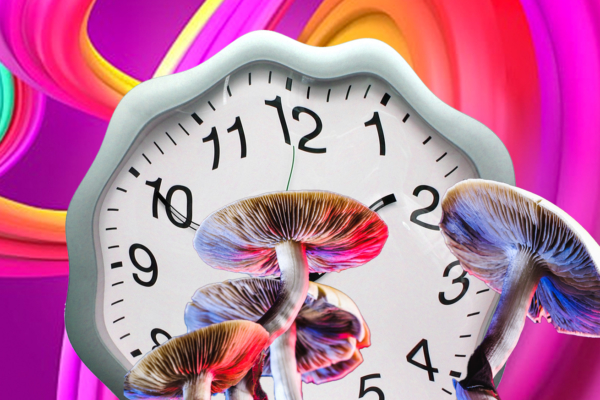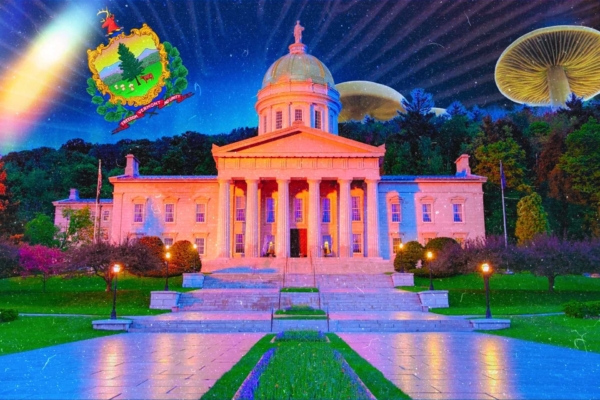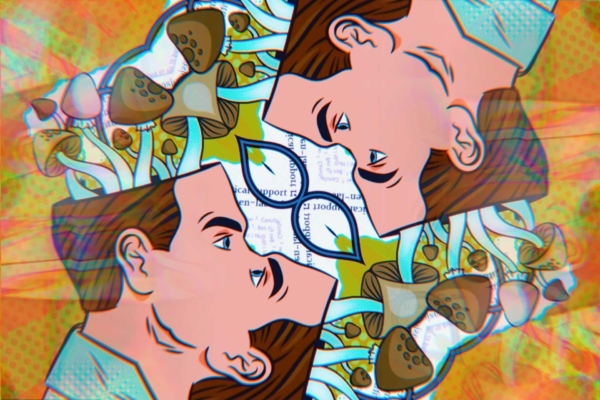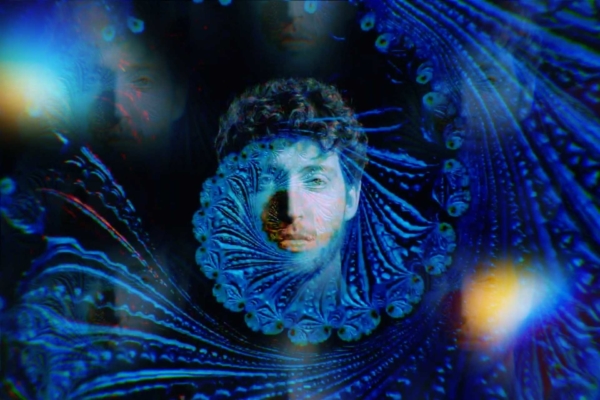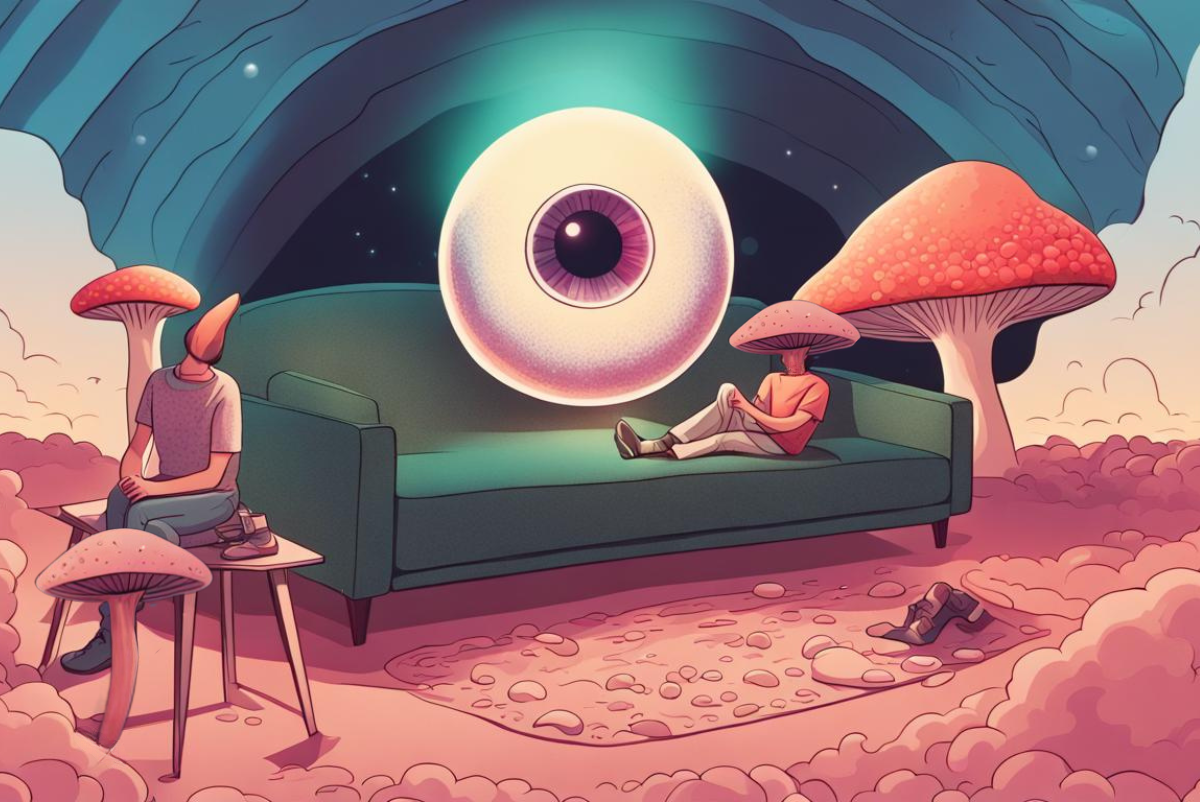
It’s no secret that waking life feels different on mushrooms, but you may wonder what produces these changes. Most of the responsibility falls on psilocybin, specifically its prodrug psilocin binding to the brain’s serotonin receptors.
These bindings increase serotonin levels, which can trigger changes in the way we perceive things. While shrooms don’t alter your senses directly, they modify how your brain processes external stimuli, heightening sensations or producing deep emotional reactions.
How Magic Mushrooms Affect Our Sense of Sight
One common misconception about mushrooms is that they produce hallucinations, but this isn’t the case. What you see during a trip is a representation of things that exist in everyday life. However, psilocybin can drastically alter the way you perceive them.
You may see colors more vividly, discern intricate details when examining things closely, or see geometric shapes forming in or around objects.
Psilocybin doesn’t alter your vision. Instead, it changes the way your prefrontal cortex processes the information it receives from your retinas.
There’s a scientific explanation as to why some users see fractals while tripping, and it’s related to how the striate cortex deciphers visual information. This area has cells that store information about geometric shapes, and when psychedelics disturb its normal activity, some cells may become overactive, making you see geometric patterns.
Dive deeper: Why Do We See Geometric Visuals When We Trip on Psychedelics? Here’s the Math
Psilocybin’s Effects on Our Sense of Hearing
Psilocybin also enhances how we hear music or even the sounds of everyday life. Users who trip out in nature become more aware of nature’s soundtrack, appreciating how birds sing, the rustling leaves in the wind, and the soothing white noise of flowing water.
Much like with sight, this isn’t due to a change in how your ears work but to how your brain processes sounds and your emotional reaction to them, which could be intensified.
Music is a crucial aspect of psychedelic trips, influencing the emotional experience and triggering memories, whether they are positive or negative.
When listening to music on magic mushrooms, you may notice sounds you ignored before, feel its resonance deep inside your body, or become completely enthralled by it, potentially changing how you think. We can engage with the music more profoundly, shutting down other thoughts and letting the sounds wash over us.
One study by Mendel Kaelen et al. studied how different people reacted to a curated playlist, and those who enjoyed it had more positive experiences. In the right conditions and with the right music, some even achieved mystical experiences, which are the foundations for long-term improvements to mental health after psychedelic use.
Read more: Should You Listen to Music During Psychedelic Treatments? How Sounds Impact the Experience
How Magic Mushrooms Affect Our Sense of Touch
The heightened perception and connectedness to your body caused by psilocybin may have made you spend considerable time feeling the texture of fabrics, wood, or your pet’s fuzzy fur during your last psychedelic trip. However, this isn’t due to a change in your sense of touch but rather to how your brain processes these stimuli.
The connection between this sense and psilocybin is largely unexplored, but Patricia Duerler et al. propose in their study that mushrooms alter the way the brain processes touch.
The study found that psilocybin decreases a brain wave response called mismatch negativity, making individuals feel more unified or detached from their bodies. This discovery positions psilocybin as a possible treatment for mental illnesses that alter one’s bodily perception.
Other Sensory Experiences Heightened by Magic Mushrooms
Now that we’ve seen how psilocybin can alter three of our main senses, it’s time to explore the other ways in which this compound can modify the way we feel and react to the world.
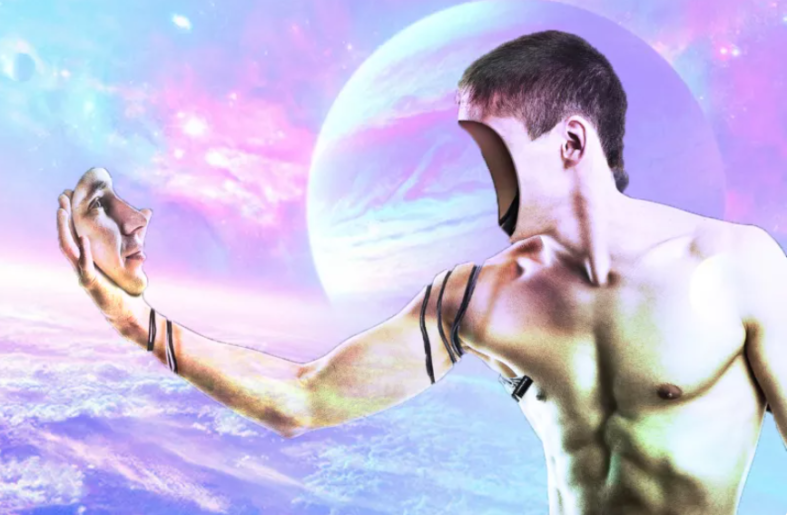
Psilocybin’s Effects on the Sense of Self
While it’s not a sense that mediates perception, psilocybin can alter your sense of self, especially in higher doses. It can produce ego dissolution, colloquially known as “ego death,” temporarily breaking the connection to your identity.
Depending on how your brain modulates the psychedelic experience, ego dissolution can induce intense anxiety as you desperately try to reconnect with yourself or feel profound unity and oneness with the universe that allows you to ponder things unrelated to your ego.
Ego dissolutions can produce noetic experiences marked by “realizations” about yourself or the world that were hidden until that moment. Most people consider these realizations to be true due to how apparent they seem during the psychedelic experience.
Ego death occurs when access to your autobiographical information is prevented due to the decoupling between the default mode network and the medial temporal lobe. Without your mind’s ability to access to this data, the identity dissolves, and you can experience unity and oneness or experience deep states of anxiety. This is why preparing your mind and external environment, also known as your set and setting, before a psychedelic journey is critical for an optimized experience of altered states of consciousness.
Although anxious ego death can be unpleasant, researchers have also observed that magic mushrooms can also offer long-term relief from anxiety and depression.
However, they can simply be fabrications that tie to your subjective experience. Therefore, it’s important to integrate these findings by talking about them with a mental health professional, such as a psychedelic facilitator, a psychedelic integration specialist, or a psychologist, to determine their significance.
For more information: Is the Trip Enough? Why Psychedelic Integration Therapy Is Important to Maximize the Benefits of Your Trip
How Shrooms Affect Our Sense of Time
Our sense of time comes from a complicated interplay of our brain’s regions, and it’s the one sense that remains consistent during our entire lives unless we develop a brain disorder. However, it’s interesting that we can experience time differently depending on our situation. When we’re focused or entertained, we feel like time slips by us, while it drags ever so slowly during dull moments.
One study found that psilocybin has the power to briefly alter our perception of time by binding to serotonin receptors. These bindings stimulate the prefrontal cortex, making time durations longer than 3 seconds feel significantly longer than they are. However, they don’t change how we perceive shorter durations of time.
Psilocybin Can Also Cause Synesthesia
Synesthesia occurs when more than one of your senses responds to stimuli. This happens automatically and involuntarily to some individuals, who may associate colors with tastes or geometric shapes with sounds.
Although it doesn’t happen to everyone, some users report temporary synesthesia while under the effects of psilocybin.
This occurs because of increased serotonin levels following ingestion, heightening the brain’s excitability and connectivity among its sensory regions. When this happens, the brain struggles to integrate sensory information correctly, producing synesthetic experiences.
Closing Thoughts
Magic mushrooms can induce complex experiences in us by changing how it feels to be alive, if only for a short while. Since we understand the world through our senses, any changes to them leave a lasting impression and can make us reconsider if life is exactly as we perceive it.
We hope this article can help you make sense of this shift in your perception or encourage you to try mushrooms for the first time to see what lies beyond your consciousness. If you trip responsibly, these experiences can positively impact your life through introspection and emotional healing.
To prepare for your first trip: How Much Shrooms Should a Beginner Take?

